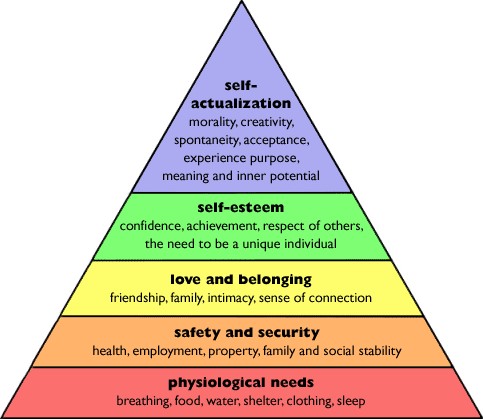The Psychology of Needs: A Look into Pittsburgh’s Homeless
Anyone in a caring profession knows the question, “What do you need?” Daily, we ask our clients, our communities, and ourselves this question in order to be as effective and healthy as possible. But this question was not created by us, but rather by a long line of psychologists who dedicated their lives to understand human behavior and development. In 1943, psychologist Abraham Maslow published his answer to this question. Instead of asking, “What is wrong with people?” he asked, “What do they need to reach their potential?” He formed a Hierarchy of Needs that every living, breathing human on earth requires. He created a diagram in the shape of a triangle, horizontally split into five sections (see below). The foundation of the hierarchy of needs is our biological and physiological needs, such as water, food, warmth, air, shelter, and sleep. For the homeless, this is a battle they fight every day. They are struggling to stay warm, hydrated, fed, and safe each day, and have to fight uncertainty about what tomorrow will bring. The Hierarchy of Needs is important to public health and the National Health Corps specifically because it allows us to understand the perspective of the clients we serve. We are able to recognize what to expect and what not to expect from our clients, and realize that only after they have a solid foundation, can they grow and become secure, connected, and self-actualized.

This is my second month at the Wellspring Center with Operation Safety Net, and already I can see Maslow’s hierarchy at play. Our job at Wellspring is to help solidify that foundation; we do this by offering a warm lunch, drinks, a place to be warm, information on shelters, meetings with case workers, and basic winter wear to stay warm. We recognize the daily need for these items as we work on their long term goals. For some, all they need is a warm lunch and social interaction. Some have been chronically homeless and prefer to stay at camps rather than shelters. Some have been homeless for two days and want help finding housing immediately. That is the reason why the question “What do you need?” is so important. It is the job of those in public service to meet people at their level and not be in the business of telling people what to do or how to live their lives. Rather, to offer support, resources, and guidance for whatever they need.
With that comes an important truth – most days, the homeless do not have their needs met. They go without something critical, and it has real effects on their development and behavior. In my time here, I have witnessed multiple fights, breakdowns, and outbursts. There is still a misunderstanding of the homeless in society and still many things I do not understand. However, I am excited to be a part of the National Health Corps not only to understand these things better myself, but to educate the public on the causes of homelessness and needs of the homeless population in Pittsburgh.